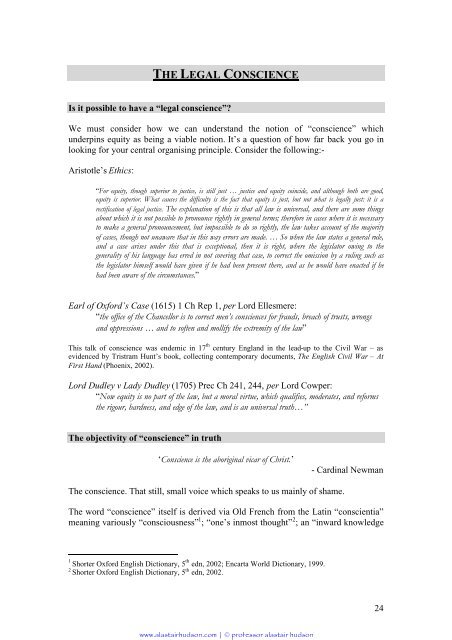THE LEGAL CONSCIENCEIs it possible to have a “legal <strong>conscience</strong>”?We must consider how we can underst<strong>and</strong> the notion of “<strong>conscience</strong>” whichunderpins <strong>equity</strong> as being a viable notion. It’s a question of how far back you go inlooking for your central organising principle. Consider the following:-Aristotle’s Ethics:“For <strong>equity</strong>, though superior to justice, is still just … justice <strong>and</strong> <strong>equity</strong> coincide, <strong>and</strong> although both are good,<strong>equity</strong> is superior. What causes the difficulty is the fact that <strong>equity</strong> is just, but not what is legally just: it is arectification of legal justice. The explanation of this is that all law is universal, <strong>and</strong> there are some thingsabout which it is not possible to pronounce rightly in general terms; therefore in cases where it is necessaryto make a general pronouncement, but impossible to do so rightly, the law takes account of the majorityof cases, though not unaware that in this way errors are made. … So when the law states a general rule,<strong>and</strong> a case arises under this that is exceptional, then it is right, where the legislator owing to thegenerality of his language has erred in not covering that case, to correct the omission by a ruling such asthe legislator himself would have given if he had been present there, <strong>and</strong> as he would have enacted if hehad been aware of the circumstances.”Earl of Oxford’s Case (1615) 1 Ch Rep 1, per Lord Ellesmere:“the office of the Chancellor is to correct men’s <strong>conscience</strong>s for frauds, breach of <strong>trust</strong>s, wrongs<strong>and</strong> oppressions … <strong>and</strong> to soften <strong>and</strong> mollify the extremity of the law”This talk of <strong>conscience</strong> was endemic in 17 th century Engl<strong>and</strong> in the lead-up to the Civil War – asevidenced by Tristram Hunt’s book, collecting contemporary documents, The English Civil War – AtFirst H<strong>and</strong> (Phoenix, 2002).Lord Dudley v Lady Dudley (1705) Prec Ch 241, 244, per Lord Cowper:“Now <strong>equity</strong> is no part of the law, but a moral virtue, which qualifies, moderates, <strong>and</strong> reformsthe rigour, hardness, <strong>and</strong> edge of the law, <strong>and</strong> is an universal truth…”The objectivity of “<strong>conscience</strong>” in truth‘Conscience is the aboriginal vicar of Christ.’- Cardinal NewmanThe <strong>conscience</strong>. That still, small voice which speaks to us mainly of shame.The word “<strong>conscience</strong>” itself is derived via Old French from the Latin “conscientia”meaning variously “consciousness” 1 ; “one’s inmost thought” 2 ; an “inward knowledge1 Shorter Oxford English Dictionary, 5 th edn, 2002; Encarta World Dictionary, 1999.2 Shorter Oxford English Dictionary, 5 th edn, 2002.24www.<strong>alastairhudson</strong>.<strong>com</strong> | © professor alastair hudson
or consciousness, an internal conviction, mental recognition or acknowledgment” 3 ; or,interestingly, “privity of knowledge”. 4This last, particular sense of “privity of knowledge” emerges from the derivation ofthe word “<strong>conscience</strong>” from the Latin “conscire” meaning “to be privy to”: that is bya conjunction of the prefix “con” with the verb “scire”, “to know”. 5 Thus a <strong>conscience</strong>contains the sense of being privy to knowledge of oneself with oneself. Such ameaning of the term <strong>conscience</strong> displays two important facets of the meaning of<strong>conscience</strong>. First, one has private knowledge of oneself <strong>com</strong>ing from the unique stateof being-in-oneself (unique in the sense that no other person can be within one’s ownself, although each individual has a being within themselves, explained bypsychoanalysts as the superego, which is separate from one’s own conscious self, orego). Secondly, there is a separation within the self such each individual sharesknowledge of herself unconsciously with the conscious self – that is, the <strong>conscience</strong>has knowledge of oneself which it shares with oneself. That is, I would suggest, the<strong>conscience</strong> speaks to the conscious self by passing a sensation to the conscious self.This bifurcation between the conscious self <strong>and</strong> the <strong>conscience</strong> is present inMacaulay’s <strong>com</strong>ment that “David can do as he likes … it is between him <strong>and</strong> his<strong>conscience</strong>”, suggesting that David’s view of the matter would need consideration byhis conscious self <strong>and</strong> by his <strong>conscience</strong> as two distinct entities albeit containedwithin one self.There is an important separation between the conscious self <strong>and</strong> the <strong>conscience</strong>. Inpsycho-analytic terms this is the distinction between ego <strong>and</strong> super-ego.Psychoanalysis explains the <strong>conscience</strong> as being “part of the superego that passesjudgments on thought <strong>and</strong> behaviour to the ego for further consideration”. 6 The<strong>conscience</strong> thus inhabits a dimension apart from the conscious ego. The manner inwhich the <strong>conscience</strong> then speaks to the conscious self is as an automatic, one-waytransmission of sensation. Predominantly, psychoanalytic theory considers that the<strong>conscience</strong> usually speaks of shame. 7 When one behaves in a way which the<strong>conscience</strong> considers to be shameful, then the <strong>conscience</strong> passes a sensation to theego.If <strong>equity</strong> were said to act on the basis of ‘a public morality expressed through thecourts’ then that would not lead to the un<strong>com</strong>fortable muddle which is generated bythe modern usage which suggests that <strong>equity</strong> is concerned with the individualdefendant’s <strong>conscience</strong> rather than with the embodiment of the sovereign’s<strong>conscience</strong> through the actions of her officials <strong>and</strong> delegates. The term <strong>conscience</strong>suggests a subjectivity at first blush. However, matters are perhaps not so easy. Tosuggest that <strong>conscience</strong> is something entirely within the individual <strong>and</strong> is somethingother than a public ethic expressed through legal principle, is to suggest that theindividual <strong>conscience</strong> <strong>and</strong> the consciousness to which it is both etymologically <strong>and</strong>metaphysically connected is not socially constructed at some level. This notion isbeautifully expressed by the playwright Luigi Pir<strong>and</strong>ello in his play Each in his ownway when the character Diego challenges the other characters who are talking about3 Shorter Oxford English Dictionary, 5 th edn, 2002.4 Shorter Oxford English Dictionary, 5 th edn, 2002.5 Shorter Oxford English Dictionary, 5 th edn, 2002.6 Encarta World Dictionary, 1999, p 403, under “<strong>conscience</strong>”.7 S Freud … .25www.<strong>alastairhudson</strong>.<strong>com</strong> | © professor alastair hudson













